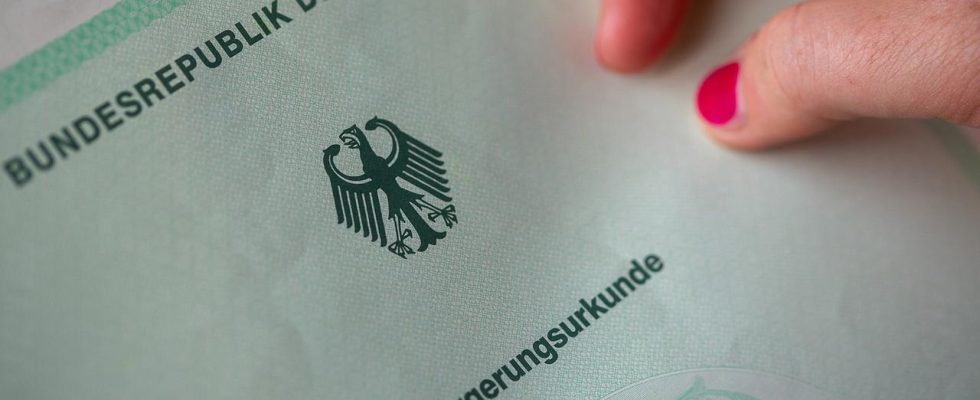The traffic light coalition has agreed on a draft law that will make naturalization faster. Dual citizenship should also be possible. Criticism of the draft comes from the CSU.
The federal government has approved a draft law on a new citizenship law by Home Secretary Nancy Faeser. This should make it easier to obtain German citizenship. Multiple citizenship or dual citizenship should also be possible.
With the reform, the federal government wants to make Germany more attractive for skilled workers, among other things. At the same time, it should provide incentives to gain a better foothold in this country and to settle into the community. “We will only attract the best minds in the world if they can become a full part of our society in the foreseeable future – with all democratic rights,” said Faeser. According to the SPD politician, modern citizenship law is a crucial key to Germany’s competitiveness.
The draft will now be forwarded to the Bundestag. If approved by Parliament, it can come into force. Ideally, that could be in January, said Faeser.
Shorter deadlines for naturalization
With the new law, naturalization will be possible in Germany after five years instead of the previous eight years. In the case of special integration services, the period should even be reduced to three years.
Proof of integration and knowledge of German remain a prerequisite for naturalization. In addition, one’s own livelihood and that of family members who are entitled to maintenance must usually be self-sufficient. Excluded from this are, among other things, people who came to the Federal Republic as so-called guest workers or contract workers.
It remains a prerequisite for naturalization to commit to the values of a free society. People who have committed crimes with anti-Semitic or racist motives are therefore expressly excluded from naturalization.
Twelve million people without a German passport
Children born in Germany to foreign parents should also automatically receive German citizenship in the future. They should also be able to retain the nationality of their parents if at least one parent has lived legally in Germany for more than five years and has an unlimited right of residence.
According to the Ministry of the Interior, around 14 percent of the population in Germany do not have a German passport. That’s a little over 12 million people. Around 5.3 million of these people have been living in Germany for at least ten years. According to the ministry, 168,545 people in Germany applied for a German passport last year – 3.1 percent of the people who have lived here for at least ten years.
Criticism from the Greens and the CSU
Green parliamentary group leader Konstantin von Notz considers parts of the reform to be unfair. He criticized in rbb info radio the requirement to earn one’s own living without social benefits. There are problems, for example, for single parents or people with disabilities.
Although the reform requires integration services for naturalization, CSU regional group leader Alexander Dobrindt accused the traffic light coalition of careless handling of citizenship law. Citizenship must come at the end of an integration process and not at the beginning. “Express naturalization with low requirements does not promote integration, but makes it more difficult,” said the head of the CSU member of the Bundestag of the dpa news agency.

